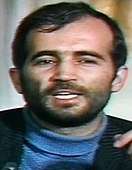1993 Iranian presidential election
The Iranian presidential election of 1993 took place on June 11, 1993 which resulted in the re-election of the incumbent president, Akbar Hashemi Rafsanjani.[2]
| |||||||||||||||||
| Registered | 33,156,055[1] | ||||||||||||||||
|---|---|---|---|---|---|---|---|---|---|---|---|---|---|---|---|---|---|
| Turnout | 50.66%[1] or 57.6%[2] | ||||||||||||||||
| |||||||||||||||||
| |||||||||||||||||
Rafsanjani's vote declined dramatically in comparison to the previous election amid a lower turnout. According to Anoushiravan Ehteshami, "little separated the candidates from each other" and "real choices and real alternatives" were absent. Out of 128 candidates who registered to run, only 4 were approved. The voter turnout was roughly half of all registered voters at 16,796,787. Discontent with the economic situation and voter apathy are the other reasons cited for the relatively low turnout in the election.[3]
United Press International reported an independent survey have found "the bulk of those who stayed away did so because they were displeased with the clergy or did not believe their vote would make any difference to the government."[2]
Campaign

None of the candidates enjoyed comparable stature to the incumbent president.[4]
Economic situation was the main issue in the elections. Rafsanjani, whose economic liberalization and privatisation policies were ongoing, said he will concentrate on economics and 'reconstruction effort', despite the deteriorated situation.[4] Economist Ahmad Tavakkoli also ran on a platform of economic reform and more benefits for the working-class.[2]
The Freedom Movement and the Nation Party, called to boycott the election due to "lack of fundamental freedoms and the denial of official recognition to most political parties".[5]
Candidates
Disqualified candidates
The Guardian Council disqualified some candidates who enrolled to run for president, including:
- Ebrahim Yazdi, Head of Political Bureau of Freedom Movement of Iran[6]
Results
| Party | Candidate | Nohen et al[7] | ISSDP[1] | UPI[2] / IRNA[8] | |||||
|---|---|---|---|---|---|---|---|---|---|
| Votes | % | Votes | % | Votes | % | ||||
| Combatant Clergy Association | Akbar Hashemi Rafsanjani | 10,449,933 | 64 | 10,566,499 | 63 | 10,553,344 | 63.2 | ||
| Independent | Ahmad Tavakkoli | 3,972,201 | 24.3 | 4,026,879 | 23.97 | 3,976,165 | 23.8 | ||
| Independent | Abdollah Jassbi | 1,511,574 | 9.3 | 1,498,084 | 8.92 | 1,515,632 | 9.1 | ||
| Independent | Rajabali Taheri | 394,981 | 2.4 | 387,655 | 2.31 | 401,579 | 2.4 | ||
| Blank or invalid votes | Not reported | 317,670 | 1.89 | 253,530 | 1.5 | ||||
| Totals | 16,328,689 | 100.00 | 16,796,787 | 100.00 | 16,700,250 | 100.00 | |||
References
- "1993 Presidential Election", The Iran Social Science Data Portal, Princeton University, retrieved 17 June 2017
- Ralph Joseph (13 June 1993), "Rafsanjani wins 63 percent of popular vote", United Press International, retrieved 5 July 2017
- Anoushiravan Ehteshami (2002). After Khomeini: the Iranian Second Republic. Routledge. pp. 68–69. ISBN 9781134838851.
- "Iran's leader set for poll victory with clerical help: President Rafsanjani expects voters to renew his mandate for economic reform", The Independent, 11 June 1993, retrieved 5 July 2017
- Canada: Immigration and Refugee Board of Canada, Iran: Chronology of Events: June 1989 - July 1994, 1 January 1995, available at: http://www.refworld.org/docid/3ae6a8170.html [accessed 6 May 2016]
- Rajaee, Farhang (2010), Islamism and Modernism: The Changing Discourse in Iran, University of Texas Press, pp. 156–157, ISBN 9780292774360
- Nohlen, Dieter; Grotz, Florian; Hartmann, Christof (2001). "Iran". Elections in Asia: A Data Handbook. I. Oxford University Press. p. 76. ISBN 0-19-924958-X.
- Anoushiravan Ehteshami (2002), After Khomeini: the Iranian Second Republic, Routledge, Table 11, p. 69, ISBN 9781134838851 – via Islamic Republic New Agency, 14 June 1993
.jpg)
